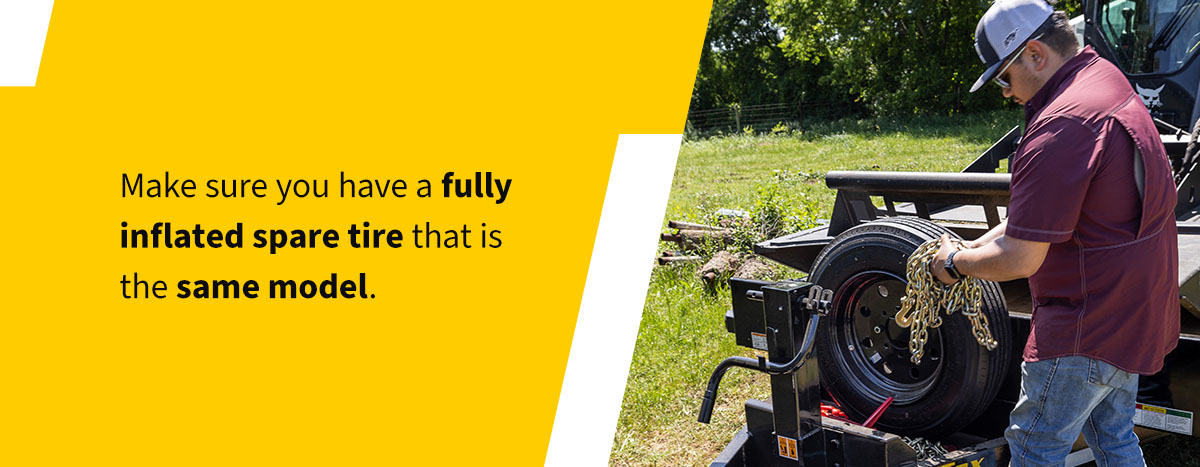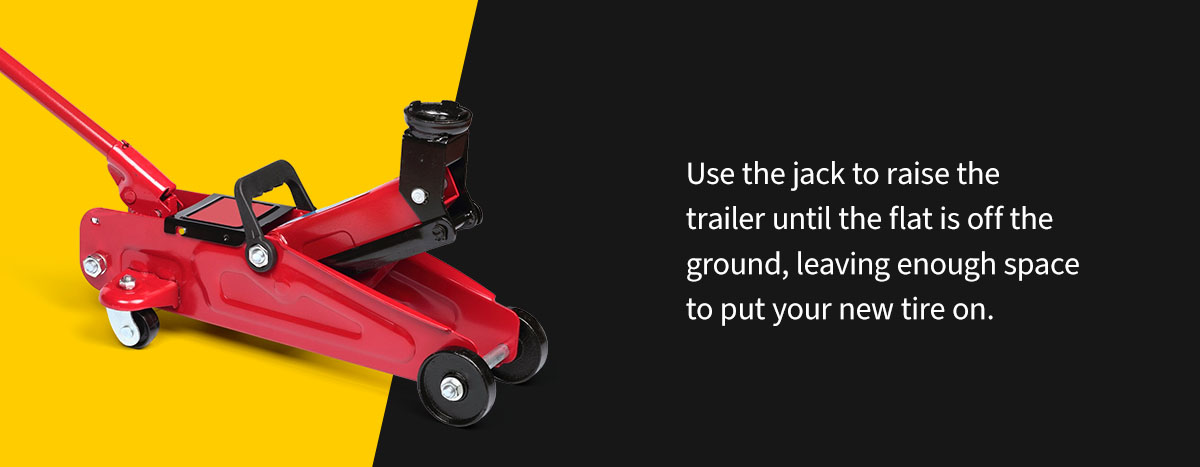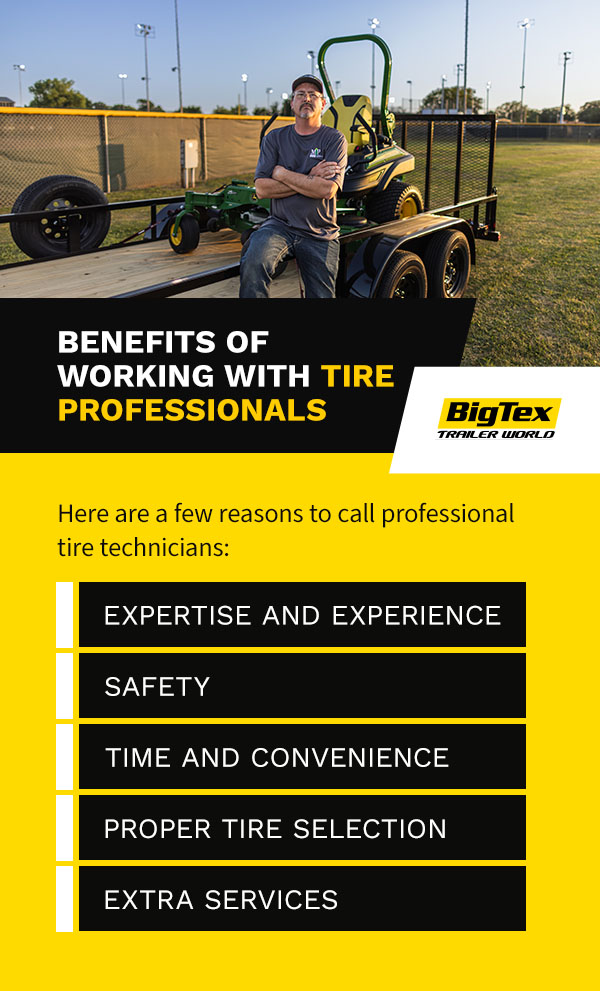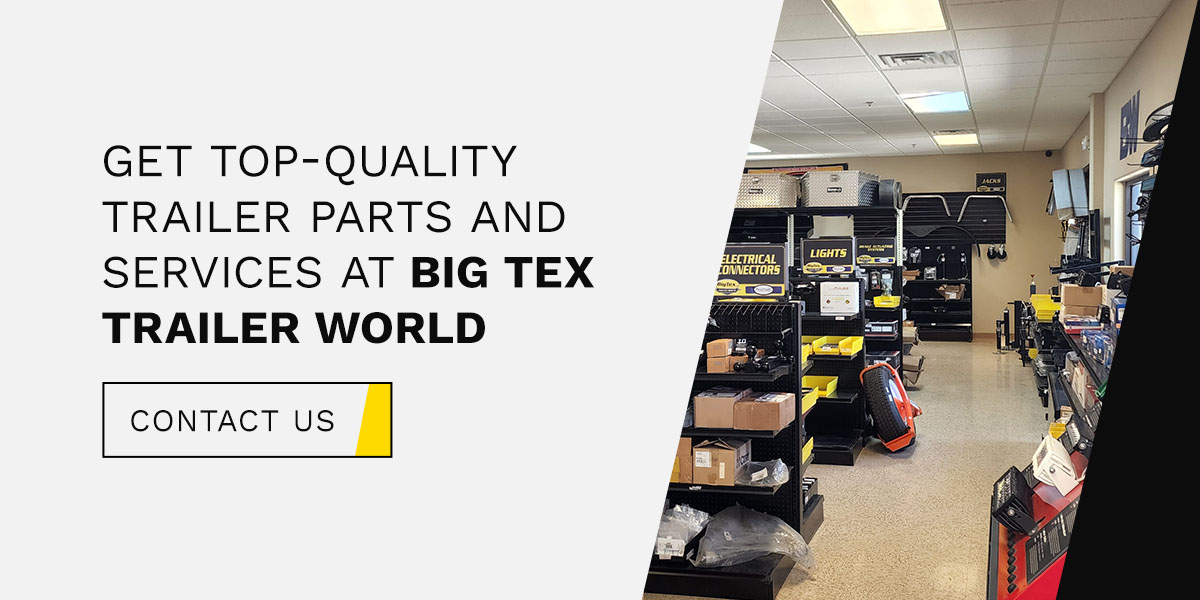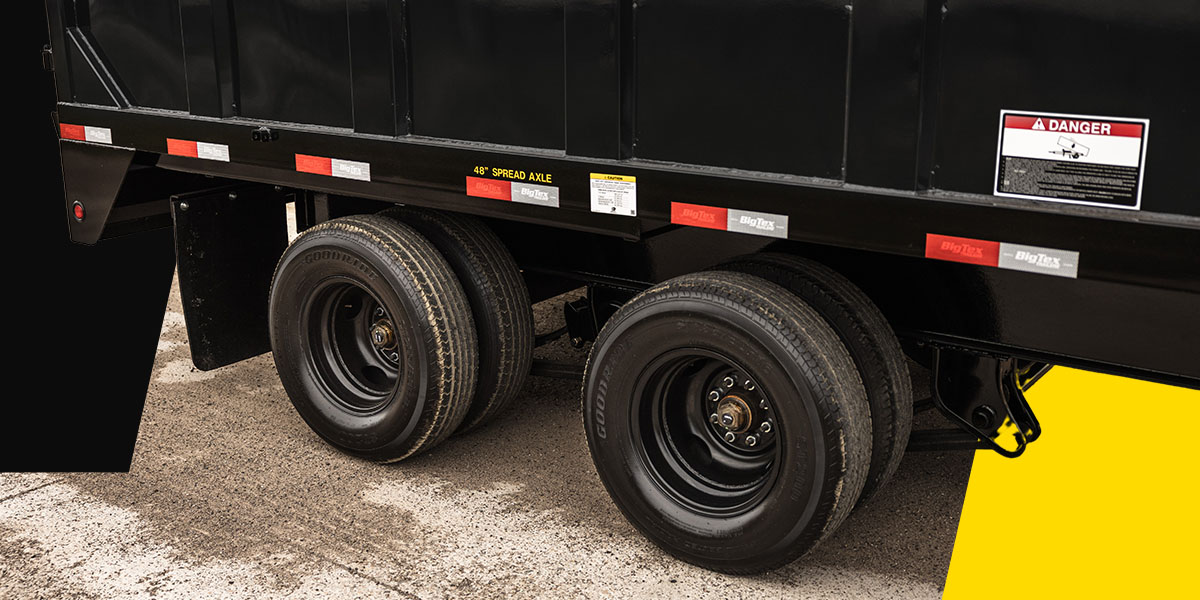
Whether it’s the result of age, weathering or a puncture, it’s important to be able to replace trailer tires when needed. Taking action right away can prevent a flat tire and the associated safety risks, downtime and dips in productivity. Thankfully, with the right tools and some practice, you can quickly and easily replace your trailer tire to get back on the road.
Here’s all you need to know about changing trailer tires, including the tools needed and steps to follow.
Why Do Tires Need Replacing?
The most common reason you might need to replace your trailer tire is because it’s flat. The most common reasons for a flat or damaged tire include:
- Gradual air loss: All tires slowly lose air, even when sitting idle. That’s why it’s important to regularly add air to your trailer tires, as they can go flat from slowly leaking over time.
- Low air pressure: Tires that are not at maximum internal pressure overheat much faster, especially when carrying heavier loads — as they might be in the case of a trailer. When your tires overheat too fast, they can become damaged and need replacing. You can prevent low air pressure by ensuring your tires are completely inflated before hitting the road.
- Weathering: If you keep your trailer outside in a lot or driveway, weathering can cause damage to the tires over time — especially sitting in the sun for hours each day. While not an issue in the short term, weather-related cracking can occur in the long run. You can prevent this damage by storing your trailer out of the sun.
- Punctures: Punctures are an example of an accident outside your control that can lead to a flat tire. You may drive over a sharp object in the road that sticks into the tire, punching a small hole that slowly leaks air until the tire becomes flat. It’s a good idea to perform a visual inspection of your trailer tires periodically to check for signs of foreign objects and punctures.
- Incorrect usage: Using the wrong tires, such as car tires, on a trailer can lead to more wear and tear and eventually damage. It’s important to use the correct type of tires for your specific trailer, as they are designed to handle heavier loads, preventing damage when hauling heavier and bulkier materials or machinery.
- Aging: Trailer tires don’t last as long as car tires, typically only holding up for a few years. After this time period, you’ll start to see cracks indicating it is time for a trailer tire replacement.
The reality is that your trailer tires will experience some wear and tear and lose air over time, making it crucial to keep them inflated and check for damage on a regular basis. By inflating and replacing your tires as needed and taking care of trailer maintenance, you can prevent a flat and keep your hauling operations running smoothly.
What You Need to Change a Trailer Tire
You’ll need the following tools to change a trailer tire:
- Spare tire: Make sure you have a fully inflated spare tire that is the same model. Note the details of your current trailer tire before buying a new one, ensuring it is the same size and load rate as the others on your trailer. You can also ask a professional what tires they recommend for your specific model.
- Jack: You’ll need a scissor jack or a sturdy hydraulic jack capable of lifting the weight of your trailer. Before using it, ensure that it is the right size and weight for your model.
- Lug wrench: It’s crucial that you have a lug wrench or lug nut wrench specifically designed for your trailer’s lug nuts. The wrench should fit the size of the lug nuts on your wheel.
- Tire iron or socket set: Depending on your type of lug nuts, you might need a socket set or tire iron to loosen and tighten them. Ensure that it is the right size to work with your lug nuts.
- Wheel chocks: It’s critical to have wheel chocks before changing a tire to ensure safety. These are the wedges or blocks you place on either side of the flat tire to prevent the trailer from rolling while lifting.
- Gloves: Wear gloves to protect your hands from grime, dirt and sharp edges while replacing your trailer tire.
- Flashlight: Keep a flashlight in your vehicle in the event you need to change a tire in low-light conditions or at night.
- Reflective triangle or flares: This safety item helps warn other drivers of your presence, especially when changing your tire on the side of a busy road.
Always consult your owner’s manual for specific tools or instructions when replacing a tire. The manual will contain recommendations from the manufacturer of your specific tire model. Additionally, ensure that you use caution and follow all safety precautions.
How to Change a Trailer Tire in 10 Steps
It’s time for a trailer tire replacement if you notice your tires are always running low on air, show signs of damage, or if you’ve had your tires for longer than the expiration date shown on the tire. Even if they’re not causing trouble yet, it’s always better to be safe than sorry to prevent further damage and the dangers of driving on a flat. Taking swift action also means you get back to your hauling projects faster.
Here’s how to change a tire on a trailer step-by-step.
1. Pull Over Your Trailer
If you suspect a flat or damaged tire, immediately pull off off the road and into a safe area away from traffic, such as a level shoulder or an area with an even, hard-topped surface. Park your vehicle with the emergency brake on.
Check if the tire allows your jack enough space to fit beneath the frame. If not, you will need to place wheel chocks or another solid object in front of the flat tire. Drive your trailer slowly forward so that the tire rolls atop the brace — high enough that you can get the jack into position. Then, place your vehicle back in park with the emergency brake engaged.
2. Loosen Lug Nuts
Gather all tools from earlier — jack, lug wrench, spare tire and other items. Use your lug wrench or socket iron set to loosen the lug nuts on the flat tire. Loosen them in a star or crisscross pattern to prevent the wheel from binding.
3. Jack Up the Trailer
When the nuts are loose, locate the right point to place your jack on the trailer, typically indicated in your manual. Place the jack under the trailer frame on the back side of the damaged tire or at the designated jack point. Position the jack correctly, ensuring it is stable and secure.
4. Lift the Trailer
Use the jack to raise the trailer until the flat is off the ground, leaving enough space to put your new tire on. Be cautious and avoid placing any part of your body beneath the trailer.
5. Remove the Lug Nuts and Flat Tire
Remove all lug nuts and remove the flat tire from the lug bolts. Carefully remove the tire from the wheel studs and set it to the side.
6. Mount the New Tire
Next, take your fully inflated tire and align it with the wheel studs. Push the wheel onto the studs until it sits flush against the trailer’s hub.
7. Tighten the Lug Nuts
Thread the lug nuts onto the wheel studs with your hands until they are snug. Then, use the wrench or tire socket set to tighten the lug nuts into a crisscross or star pattern. Avoid overtightening, but make sure they are secure.
8. Lower the Trailer
Using your jack, slowly lower the trailer until the tire has reached the ground. Remove the jack and place it to the side. Give the lug nuts a final tightening using your lug wrench or tire socket set. Remember to do so following the crisscross pattern, ensuring they are properly secured.
9. Verify Tire Pressure
Check your new tire’s pressure to make sure it is properly inflated and at the recommended level for your specific trailer. Adjust if needed. Clean up your tools and place them in the correct storage area. Remove the wheel chocks and store the flat tire safely in your vehicle or trailer.
10. Test the New Tire
Take a short test drive to make sure your new tire is properly installed and functioning safely. Pay attention to any strange vibrations or issues with handling the trailer.
Benefits of Working With Tire Professionals
Even with a tutorial and the proper tools, sometimes it can be difficult to change a trailer tire on your own. Changing trailer tires can be physically demanding and potentially dangerous, especially without the experience or necessary tools.
Here are a few reasons to call professional tire technicians:
- Expertise and experience: Professionals have knowledge and years of experience handling all kinds of tires and trailers. They also have the training to perform a tire replacement quickly and correctly, reducing the risk of error or damage.
- Safety: It can be dangerous to attempt to change a trailer tire on your own for the first time. Professionals have experience and the right equipment, including hydraulic lifts, to safely lift and secure your trailer while replacing the tire.
- Time and convenience: Hiring a professional saves you both time and effort. They will quickly assess your situation, find the right replacement tire for your trailer and perform all steps needed to get you back on the road faster. They may also provide mobile tire services, so you don’t need to transport your trailer to a tire shop.
- Proper tire selection: Professionals can help you determine the proper tire model for your trailer. They have the knowledge to find a tire with the correct load rating, size and tread pattern. Working with a professional can ensure you get access to expert advice based on your exact trailer and usage requirements.
- Extra services: Many tire and trailer professionals offer services like tire balancing and alignment, which can enhance your tires’ longevity. They can also note any signs of wear and damage, ensuring your trailer can safely handle any hauling project you take on.
Why Choose Big Tex Trailer World
The team at Big Tex Trailer World has years of experience replacing tires on all types of trailers, and we look forward to helping you. We take pride in offering industry-leading knowledge and technical expertise, whether you’re looking for a tire replacement, repair, maintenance services or a specific product or part.
Partner with us for your trailer servicing needs and enjoy the following benefits:
- Customer-focused support: Our friendly and knowledgeable team will assist you before, during and after a service or sale. Plus, our call center is staffed with experts who are ready to answer any questions.
- Over 60 locations: Big Tex Trailer World has over 60 store locations where you can find the right trailer, parts and accessories for your specific industry, hobby or applications. Visit a convenient location near you and browse affordable, world-class products and services.
- Free inspection: Our expert technicians can perform free inspections, checking your equipment’s functionality and performance. An inspection includes assessing your battery, breakaway system, lights, coupler, tires, ramps and more.
- Vast inventory: Our selection includes over 4,000 high-performance trailer parts and accessories. Whether you need brake parts, a trailer jack or new tires, you can find it at a competitive price. Our products come from some of the industry’s most trusted manufacturers that align with your trailer’s specific make and model.
Get Top-Quality Trailer Parts and Services at Big Tex Trailer World
As a trailer owner, it’s important that you know how to change your tires. Having the tools and skills in emergency situations can ensure you return to your task quickly and safely.
At Big Tex Trailer World, we offer trailer tire replacements and other services to help you haul your items and machinery efficiently. You’ll also find an extensive selection of durable trailer parts and products, so you always have what you need to change your trailer tires and handle other critical maintenance tasks.
Our trailer technicians can provide you with the services and resources you need, answering any questions you might have and helping you find the right tires and parts for your trailer. From routine maintenance and repairs to upgrades, we are here to help. You can also find rental trailers at many of our locations, ensuring you keep operations moving while your trailer is in the shop.
Get back on the road in no time with Big Tex Trailer World. Browse our trailer parts or schedule a free estimate for trailer services at a store near you.
